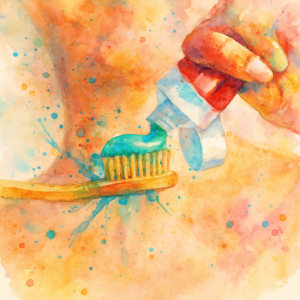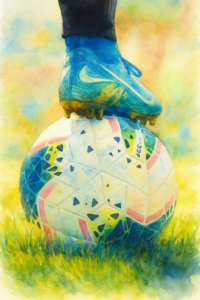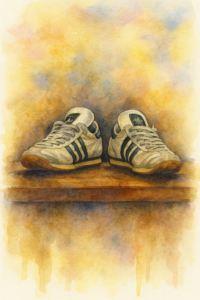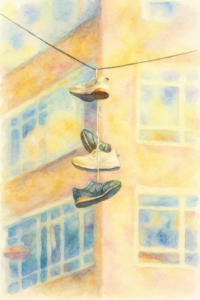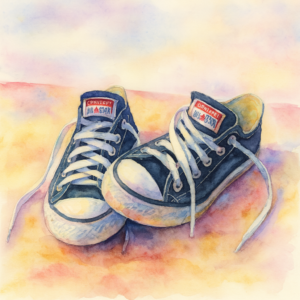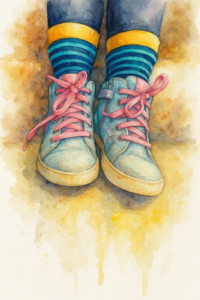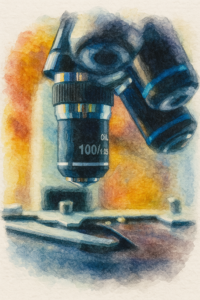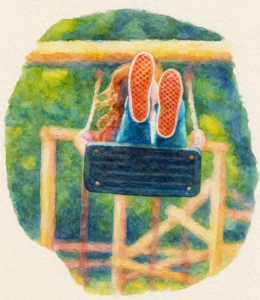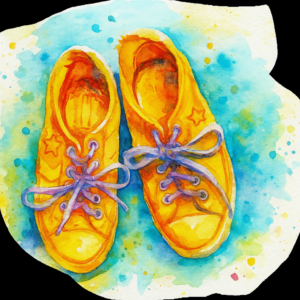Learn French with this clip from Les P’tits Bateaux. Find the full episode here. We do not own the content. The above audio sample and transcription is from Les P’tits Bateaux podcast. We do not own the content. Listen to the entire episode here. un peu beurk What’s opening up for you with this clip?…
Start quiz, type what you hear, then join the conversation.
Did you find this one challenging or easy? Did you hear something diffferent? What surprised you? What levels did you complete? Comment below and share what’s opening up for you with this quiz.
Learn French with this clip from Les P’tits Bateaux. Find the full episode here. We do not own the content.
The above audio sample and transcription is from Les P’tits Bateaux podcast. We do not own the content. Listen to the entire episode here.
un peu beurk
What’s opening up for you with this clip? Comment below with what was surprising, easy, challenging and/or interesting.
The snippet in English
Find a translation of this snippet here, how much of this did you hear?
Et les pieds qui puent, mais aussi le vomi, le caca, les croûtes, les proutes, les verrues, les crottes de nez… Bref, tous les trucs un peu beurk, vous attendent en podcast sur l’application Radio France pour une collection spéciale : Les Petits Crados. Alors salut les crados !
And smelly feet, but also vomit, poop, scabs, farts, warts, boogers… In short, all the gross stuff you’d expect to find in a podcast on the Radio France app for a special collection: Les Petits Crados. So hello, you dirty little things!
The above translation from Deepl
What does “le vomi” mean?
le vomi — (vomit)
Il y avait du vomi sur le trottoir.
(There was vomit on the sidewalk.)
Informal, everyday term. Used for both the act and the substance. Neutral but unpleasant.
What does “le caca” mean?
le caca — (poop)
Le bébé a fait caca.
(The baby pooped.)
Very informal, childish term. Common with kids or in playful contexts.
What does “les croûtes” mean?
les croûtes — (scabs / crusts)
Il ne faut pas gratter les croûtes.
(You shouldn’t scratch scabs.)
Used for healing skin or crusty food (like bread). Neutral but context-dependent.
What does “les proutes” mean?
les proutes — (farts)
Les enfants rigolent toujours quand quelqu’un fait des proutes.
(Kids always laugh when someone farts.)
Very informal, childish word. More common as les pets in standard French. Used playfully.
What does “les verrues” mean?
les verrues — (warts)
Il a des verrues sur les doigts.
(He has warts on his fingers.)
Neutral medical term. Common in health and dermatology contexts.
What does “les crottes de nez” mean?
les crottes de nez — (boogers)
Les enfants mettent parfois leurs crottes de nez sous la table.
(Kids sometimes put their boogers under the table.)
Informal and childish. Common in everyday talk with or about kids.
What does “bref” mean?
bref means “in short” or “anyway.”
Bref, on a tout annulé.
(In short, we canceled everything.)
Used to summarize, shift topics, or wrap things up quickly. Very common in speech, often marks impatience or efficiency.
Cultural note: The 2011 French web series Bref. made the word iconic in youth culture — fast, punchy storytelling with this word as a running hook. Now often used with irony or emphasis.
What does “les trucs” mean?
les trucs means “things” or “stuff.”
J’ai encore plein de trucs à faire aujourd’hui.
(I still have lots of things to do today.)
Informal and very common in spoken French. Used when the exact word is unknown, forgotten, or unnecessary — like stuff, things, or whatchamacallits in English. Can refer to objects, tasks, ideas, or even tricks (un truc pour apprendre vite = a trick for learning quickly).
Cultural note: truc is extremely flexible. In casual speech, you’ll hear it constantly — c’est quoi ce truc ?, file-moi le truc là, or j’ai un truc à te dire. It can also be used vaguely or humorously when someone doesn’t want to be too specific.
What does “beurk” mean?
beurk means “yuck” or “ew.”
Beurk, je ne vais jamais manger ça !
(Yuck, I’m never eating that!)
It’s an expressive interjection used to show disgust, especially toward food, smells, or something gross. Common in everyday speech, especially with kids or in humorous contexts. Similar to yuck, eww, or gross in English.
Cultural note: Often used in cartoons, children’s books, or jokes. French has a few other similar interjections (pouah, berk), but beurk is the go-to for anything revolting, silly, or just plain unpleasant. It’s all about the tone — exaggerated delivery adds to the effect.
What does “crados” mean?
crados means “gross,” “filthy,” or “nasty.”
Ces toilettes sont vraiment crados.
(These toilets are really gross.)
Informal, slangy, and often used to describe something dirty or disgusting — places, objects, even people. Derived from crade (slang for dirty).
Cultural note: Common in casual speech, especially among teens or young adults. Not vulgar, but not polite either — best avoided in formal situations. Often carries a tone of judgment or playful exaggeration.
Les P’tits Bateaux Podcast
Official synopsis: Les enfants posent des questions, des spécialistes leur répondent. Jeunes (et moins jeunes !) peuvent poser toutes les questions possibles et imaginables directement par message vocal via franceinter.fr, sauf pendant les vacances.
I recently discovered this podcast from InterFrance and love it. It’s kids posing questions and the host brings in experts to explain. And it’s aimed at young French kids, not French learners. That’s my favorite kind of content. Being for French kids is what makes it so good.
You’ve got real people (a kid, a host, and an expert), all speaking real French — no AI generated stuff here. The kid asks a question, and then an expert explains it in short, clear language. There’s a ton of repetition, natural turns of phrase, and just enough challenge to keep your ears working.
And because it’s meant for French-speaking kids, the adults naturally explain things simply but not condescendingly. You get exposed to rhythm, tone, interjections (bah, ben, alors), and full sentences — but also some real dialogue dynamics. And that’s gold if you’re trying to move from textbook filler to actually speaking and thinking in French.
Improving your French Listening Comprehension with Podcasts
On this site, fast spoken French is finally accessible to all levels. The tool break podcasts into short clips each set to transcription fill-in-the-blank practice. My favorite practice in class is always dictées. While they can seem overwhelming at first, the confidence boost and skills payoff for doing the work pays off. They’re perfect for anyone at any level, from advanced students to those just starting.
We use podcasts and our practice exercises to make it possible for anyone, anywhere to immerse in French with fun and ease. Join us and enjoy French, one short clip at a time. Let’s learn together!
Make the most of the site:
- Daily Podcast Listening: Start your day with a French podcast from our collection. Choose episodes that align with your interests to keep it engaging.
- Active Listening Practice: As you listen, try to pick out key phrases and vocabulary. Use our daily quizzes to test your understanding and reinforce learning.
- Repeat and Shadow: Listen to the same podcast segment multiple times. Try to mimic the pronunciation and intonation to improve your spoken French.
- Note-taking: Jot down new words or phrases you encounter. Review these notes regularly to enhance vocabulary retention.
- Reflect and Respond: After each episode, summarize the main points in French, either in writing or aloud. This helps in consolidating your learning and improving your expressive skills.
- Read More:
- True Beginner or A1 Learners: discover tips learning with podcasts at an introductory level.
- Discover all the podcast clips on FrenchIRL organized by level.
- Top Tips: Here’s how I make the most of my own site.
I created the French In Real Life project because I wanted to understand more than just my teacher and youtubers who cater to learners. I wanted to understand the French I hear in France. I hope you can benefit as much as I have. Become a supporting member for access to all clips.
What’s opening up for you?
Comment below with what’s opening up for you with this clip. What do you love about this? What was challenging? What was easy? Share your learning progress below!
Learn French with this clip from Les P’tits Bateaux. Find the full episode here. We do not own the content. The above audio sample and transcription is from Les P’tits Bateaux podcast. We do not own the content. Listen to the entire episode here. un peu beurk What’s opening up for you with this clip?…
Start quiz, type what you hear, then join the conversation.
Did you find this one challenging or easy? Did you hear something diffferent? What surprised you? What levels did you complete? Comment below and share what’s opening up for you with this quiz.
